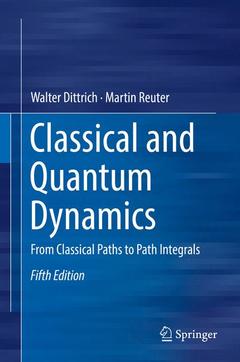Classical and Quantum Dynamics (5th Ed., Softcover reprint of the original 5th ed. 2017) From Classical Paths to Path Integrals
Auteurs : Dittrich Walter, Reuter Martin

Prof. Dr. Walter Dittrich had been head of the quantum electrodynamics group at the University of Tübingen. He started his work on gauge theories and QED in collaboration with Julian Schwinger. Walter Dittrich has worked for more than 20 years in cooperation with the Institute for Advanced Studies at Princeton and the National Accelerator Laboratory at Stanford (SLAC). He has over 30 years of teaching experience and is one of the key scientists in developing the theoretical framework of quantum electrodynamics.
Prof. Dr. Martin Reuter is head of the quantum Einstein gravity group at the Institute for High Energy Physics of the University Mainz. His research focuses on particle physics, quantum field theory and quantum Einstein gravity. He worked in close collaboration with the synchrotron facility DESY and the large hadron collider collaborations at CERN. He has more than 30 years of teaching experience in theoretical physics.Highlights the principle of stationary action as common starting point of classical and quantum mechanics
Perfect companion for courses on path integrals, on advanced mechanics or quantum mechanics and semiclassical methods
New edition showcases updates for all chapters and a new chapter with a clear and explicit account of Lie-Brackets and pseudocanonical transformations
Includes supplementary material: sn.pub/extras
Includes supplementary material: sn.pub/extras
Date de parution : 07-2018
Ouvrage de 489 p.
15.5x23.5 cm
Mots-clés :
Action Angle Variable; Adiabatic Invariance Physics; Berry's Phase; Canonical Perturbation Theory; Hamilton Jacobi Equation; Introduction to Classical and Quantum Field Theory; Path Integral Physics; Schwinger Action Principle; Textbook Classical Dynamics; Textbook Quantum Dynamics; Textbook Quantum Mechanics; Topology Quantum Mechanics; Lie Brackets



